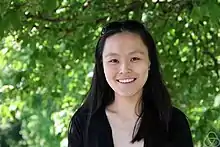Wei Ho
Wei Ho is an American mathematician specializing in number theory, algebraic geometry, arithmetic geometry, and representation theory. She is an associate professor of mathematics at the University of Michigan in Ann Arbor, Michigan.
Wei Ho | |
|---|---|
 Wei Ho at the Mathematical Research Institute at Oberwolfach, 2015 | |
| Citizenship | United States |
| Alma mater | Princeton University |
| Known for | Number theory |
| Awards |
|
| Scientific career | |
| Fields | Mathematics |
| Institutions | |
| Thesis | Orbit parametrizations of curves (2009) |
| Doctoral advisor | Manjul Bhargava |
| Website | www-personal |
Education and career
Wei Ho grew up in Wisconsin where she attended New Berlin West High School in New Berlin, Wisconsin. During her middle and high school years, she participated in the Wisconsin Math League, the MATHCOUNTS competition, and the American Invitational Mathematics Examination (AIME), the USA Mathematical Talent Search (USAMTS). After her freshman year at New Berlin, Ho attended the Young Scholar Summer Program (YSSP) at the Rose-Hulman Institute of Technology in Terre Haute, Indiana. Her performance on the US National Chemistry Olypmiad qualified her for a two-week study camp at the U.S. Air Force Academy in Air Force, Colorado. Ho played on the varsity tennis team and played violin in various orchestras while at New Berlin.[1]
In 2003, Ho received both Master's and bachelor's degrees from Harvard University in Cambridge, Massachusetts. While at Harvard, she completed a senior honors thesis entitled The Main Conjecture of Iwasawa Theory under the supervision of Noam Elkies.[2] After college, Ho won a Harvard Herchel Smith Fellowship in Science, which enabled her to spend a year abroad at the University of Cambridge in Cambridge, England, where she completed a certificate of advanced study in mathematics, Part III of the Tripos, (with distinction).[2] In 2009, she completed her PhD in mathematics at Princeton University in Princeton, New Jersey under the supervison of Manjul Bhargava.[3] She was awarded a National Science Foundation (NSF) Postdoctoral Fellowship, which enabled her to conduct research at Harvard University and Princeton University.[4]
In 2010, Ho became a Joseph Fels Ritt Assistant Professor at Columbia University in New York. Ho joined the faculty at the University of Michigan as an assistant professor in 2014 and was promoted to associate professor in 2019.[2]
Recognition
In 1994, at the age of 10, Ho got an 800 on the math portion of the SAT subject test, becoming perhaps the youngest girl to achieve that feat at the time.[5] In 1999, Ho won a Gold Medal while representing USA at the International Chemistry Olympiad.[2][6] In 2003, the Association for Women in Mathematics selected Ho as a runner-up for the Alice T. Schafer Prize for Excellence in Mathematics by an Undergraduate Women.[7] In that same year, Ho received the Herman Peries Prize for excellent performance in the Mathematical Tripos at Emmanuel College, University of Cambridge.[2] In 2017, Ho was awarded a Sloan Research Fellowship by the Alfred P. Sloan Foundation.[8][9][10]
References
- Ho, Wei (1 December 2002). "Math Outside the Classroom". Imagine. 5 (4): 14–15. doi:10.1353/imag.2003.0122. ISSN 1086-3230. Retrieved 11 January 2021.
- "Wei Ho" (PDF). University of Michigan. Retrieved 10 January 2021.
- Wei Ho at the Mathematics Genealogy Project
- "NSF Award Search: Award#0902853". PostDoctoral Research Fellowship. Retrieved 10 January 2021.
- "Girl, 10, gets perfect score on math SAT". Chicago Tribune. 7 March 1994.
- "U.S. Chemistry Olympiad Teams". American Chemical Society. Retrieved 31 January 2021.
- "Alice T. Shafer Mathematics Prize". Associaotn for Women in Mathematics. Retrieved 10 January 2021.
- Diaz-Lopez, Alexander (December 2018). "Wei Ho Interview" (PDF). Notics of the American Mathematical Society. 65 (11): 1417–1419. doi:10.1090/noti1762. Retrieved 10 January 2021.
- "Wei Ho Receives Sloan Fellowship". U-M LSA Mathematics. 22 March 1966. Retrieved 10 January 2021.
- "Past Fellows". Alfred P. Sloan Foundation. Retrieved 10 January 2021.
External links
- Official website
- Wei Ho's Author profile at MathSciNet